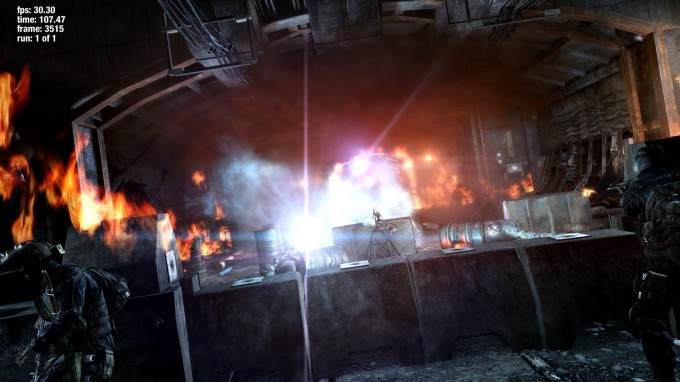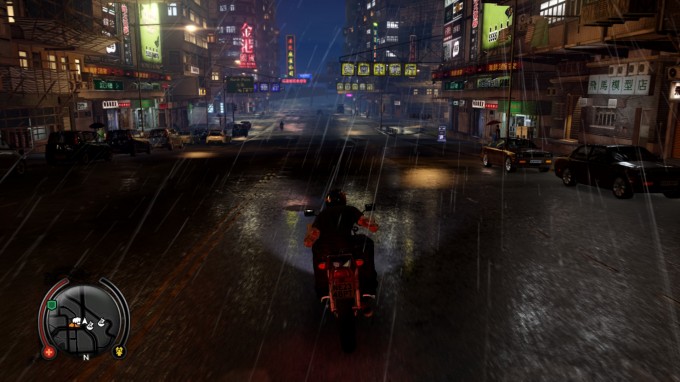- Qualcomm Launches Snapdragon 4 Gen 2 Mobile Platform
- AMD Launches Ryzen PRO 7000 Series Mobile & Desktop Platform
- Intel Launches Sleek Single-Slot Arc Pro A60 Workstation Graphics Card
- NVIDIA Announces Latest Ada Lovelace Additions: GeForce RTX 4060 Ti & RTX 4060
- Maxon Redshift With AMD Radeon GPU Rendering Support Now Available
NVIDIA GeForce GTX 980 Review: Does Maxwell Bring Maximum Gameplay?

NVIDIA’s next-gen GeForce series is here, and it brings with it a slew of new features and enhancements worth knowing about. Based on Maxwell, the GTX 900 series delivers much-improved performance-per-watt, with the GTX 980 in particular performing better than the 780 Ti – but with a TDP of 85W less. You read that right. Let’s dig in.
Page 6 – Game Tests: Metro Last Light, Sleeping Dogs
Crysis has become infamous for punishing even top-end systems, but let’s be fair: The Metro series matches, if not exceeds its requirement for graphical horsepower. That was proven by the fact that we used Metro 2033 in our testing for a staggering three years – only to be replaced by its sequel, Last Light. I’m not particularly a fan of this series, but I am in awe of its graphics even at modest settings.
Manual Run-through: Because this game is a real challenge to benchmark with for both the reasons of variability in the results and the raw challenge, I choose to use the built-in benchmark here but rely on Fraps to give me more accurate results.
Note: Metro Last Light‘s built-in benchmark is not representative of the entire game; some levels will punish a GPU much worse than this benchmark will (namely, “The Chase”, which has lots of smoke and explosions). What this means is that while these settings might suffice for much of the game, there might be instances where the performance degrades enough during a certain chapter or portion of a chapter to force a graphics setting tweak.
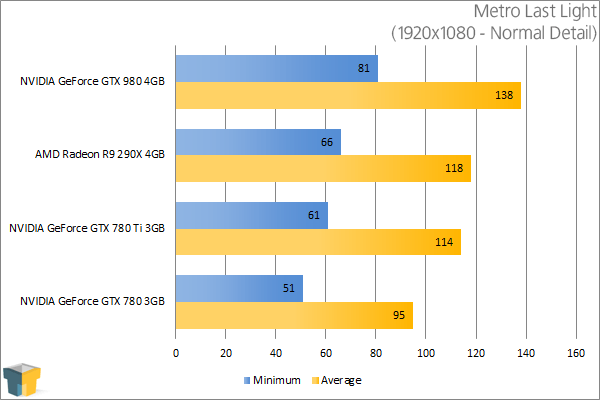
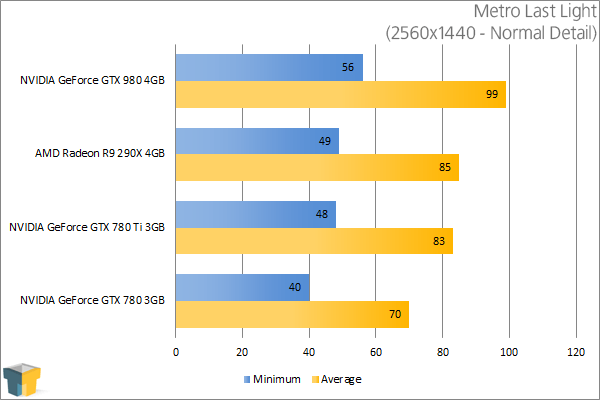
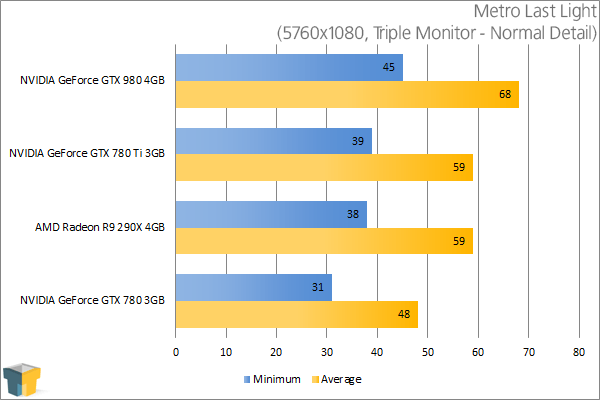
All of the cards handle this benchmark just fine at 1440p and under, and for the most part, the same could be said about our multi-monitor resolution. The 780 Ti and 290X fall a bit behind the 980 (which is to be expected), but they still settle in at 60 FPS. Again though, this benchmark is not representative of real gameplay at all (this and SHOGUN 2 are the only ones in our suite that fall into this camp); like 3DMark, it’s simply a benchmark to see what each card is capable of in a perfect scenario.
Sleeping Dogs
Many have called Sleeping Dogs (our review) the “Asian Grand Theft Auto“, but the game does a lot of things differently that helps it stand out of the crowd. For example, in lieu of supplying the player with a gazillion guns, Sleeping Dogs focuses heavily on hand-to-hand combat. There are also many collectibles that can be found to help upgrade your character and unlock special fighting abilities – and if you happen to enjoy an Asian atmosphere, this game should fit the bill.
Manual Run-through: The run here takes place during the chapter “Amanda”, on a dark, dank night. The saved game begins us at the first apartment in the game (in North Point), though that’s not where I begin capturing the framerate. Instead, I first request our motorcycle from the garage. Once set, I begin recording the framerate and drive along a specific path all the way to Aberdeen, taking about two minutes.
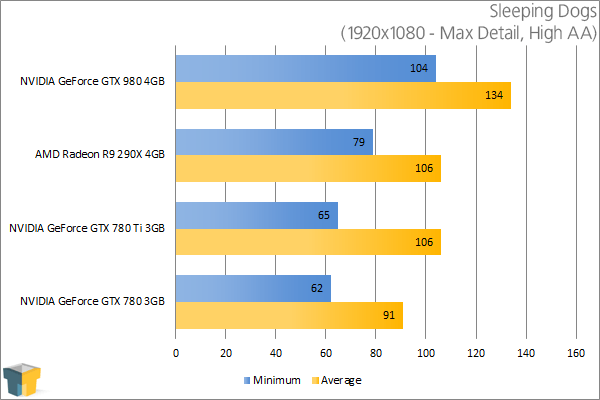
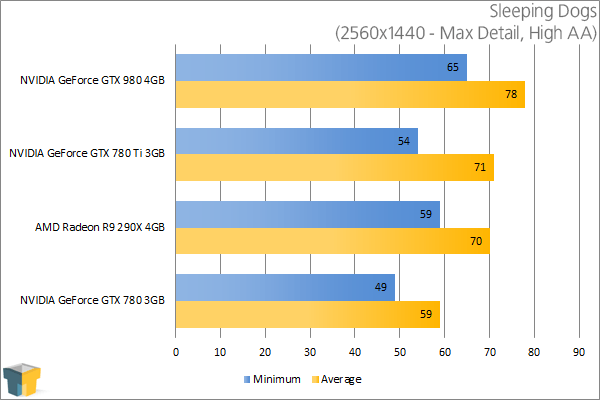
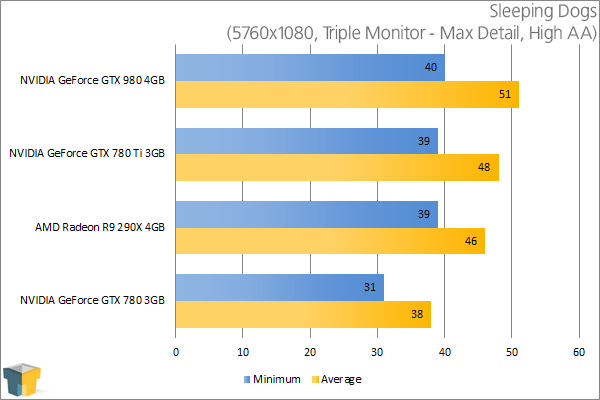
Sleeping Dogs might have come out two-years-ago, but I’d argue to the death the fact that it’s still one of the best-looking games out there. Once again, the only resolution to prove challenging is 5760×1080, but reducing the anti-aliasing to “Normal” (which admittedly won’t make a large difference in game) would boost the top three cards past 60 FPS, and the 780 close to it.
Support our efforts! With ad revenue at an all-time low for written websites, we're relying more than ever on reader support to help us continue putting so much effort into this type of content. You can support us by becoming a Patron, or by using our Amazon shopping affiliate links listed through our articles. Thanks for your support!




